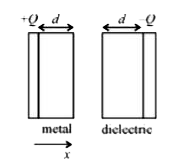A parallel-plate capacitor is clamped to a stand such that its plates are vertical. It remains connected to a cell through a centre-zero galvanometer. A metal sheet which is parallel to the plate of the capacitor and whose thickness is slightly less than the seperation between these plates is now allowed to fall under gravity though the plates, wihtout touching them.
Which of the following correctly described the motion of the metal plate as it passes through the plates of the capacitors ?
It will move with a constant acceleration equla to g the acceleration due to gravity.
It will move with a constant acceleration less than g.
It will move with a constant accelration greater than g.
It will move with variable acceleration less than the accelaration due to gravity.
The correct Answer is:D
Topper's Solved these Questions
- PRACTICE WORKSHEET 2BOOK - D MUKHERJEECHAPTER - PRACTICE WORKSHEET 2EXERCISE - Assertion- Reason Type
3 Videos
- PRACTICE WORKSHEET 1BOOK - D MUKHERJEECHAPTER - PRACTICE WORKSHEET 1EXERCISE - Matrix-Matching Type
1 Videos
- PRACTICE WORKSHEET 3BOOK - D MUKHERJEECHAPTER - PRACTICE WORKSHEET 3EXERCISE - Matrix-Matching Type
1 Videos
Similar Questions
Knowledge Check
A parallel-plate capacitor is clamped to a stand such that its plates are vertical. It remains connected to a cell through a centre-zero galvanometer. A metal sheet which is parallel to the plate of the capacitor and whose thickness is slightly less than the seperation between these plates is now allowed to fall under gravity though the plates, wihtout touching them.
Which of the following correctly describes the deflection(s) of the galvanometer?AIt will show a constant deflection to one side only, as long as the sheet is passing through the plates.BIt will show a variable deflection to one side only, as long as the sheet is passing through the plates.CIt will show deflection first to one side and then to the other.DIt will not show any deflection first to one side and then to the other.A parallel-plate capacitor is clamped to a stand such that its plates are vertical. It remains connected to a cell through a centre-zero galvanometer. A metal sheet which is parallel to the plate of the capacitor and whose thickness is slightly less than the seperation between these plates is now allowed to fall under gravity though the plates, wihtout touching them.
In the entire process of the metal sheet passing through the plates, which of the following statements will not be correct ?AIts gain in kinetic energy will be less than its loss in gravitational potential energy.Bsome heat will be produced in the electrical circuitCThe cell will lose some electrical energy but never gain any energyDThe current through the cell will reverse in direction at some point.A parallel plate capacitor is charged by connecting is plates to the terminals of a battery. The battery remains connected to the condenser plates and a glass plate is interposed between the plates of the capacitor, then
AThe charge increases while the potential difference remains constantBthe charge decreases while the potential difference remains constantCthe charge decreases while the potential difference increasesDthe charge increases while the potential difference decreases
Plates of a parallel plate capacitor are at a separation 3d. Region between the plates is filled with a metal plate and a dielectric each of thickness d as shown. Which of the following graphs correctly represent variation of potential V with x?

View SolutionAs the distance between the plates of a parallel plate capacitor decreased
View SolutionForce of attraction between the plates of a parallel plate capacitor is
View SolutionAs the distance between the plates of a parallel plate capacitor decreased
View SolutionChoose the most appropriate option.
A parallel plate capacitor is connected to a battery. A metal sheet of negligible thickness is placed between the plates. The sheet remains parallel to the plates of the capacitor. Which of the following is correct?
View Solution
